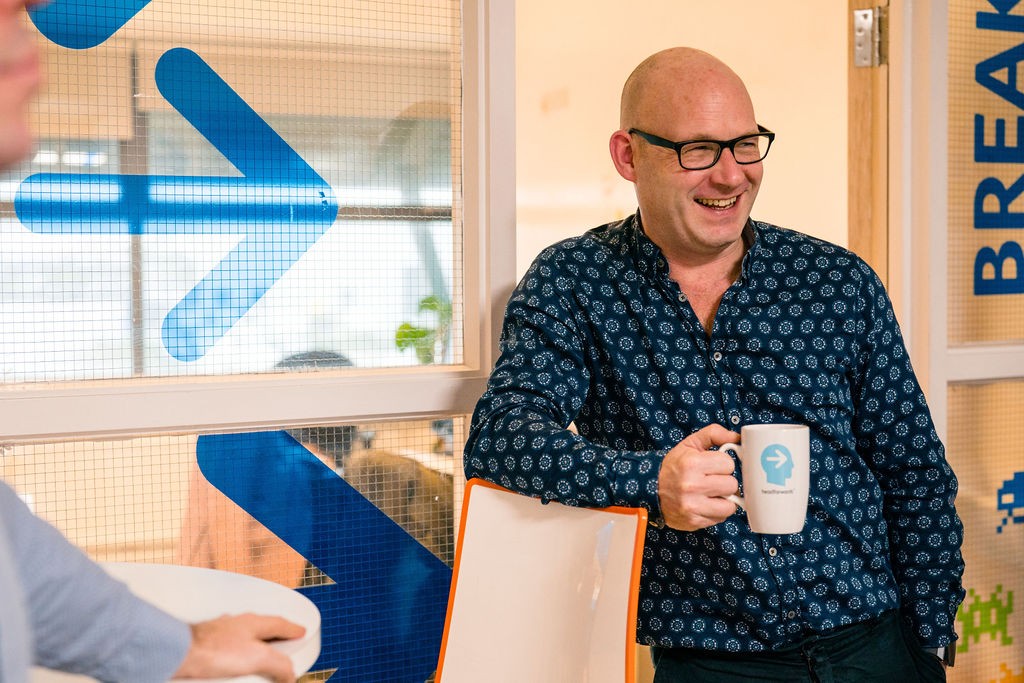Driving all stages of startup development: Ian Merricks, Chair, The Accelerator Network
Posted on 10th September 2020 by Jon Howell

Welcome to our TechBritannia podcast where we fly the flag for British technology. Each episode we will be talking with someone who is doing their bit to turn Britain into a global powerhouse of ideas and innovation. Our focus is not purely on British people but encompasses the multicultural mix of attitudes and philosophies that are prevalent in academic teams, startups, and established companies based in the UK.
Today we talk with Ian Merricks who explains the many ways The Accelerator Network, which he chairs, has been helping UK startups for almost a decade. TechBritannia’s co-Founder Rose Ross quizzes him about the success of the Accelerator Academy, plus delves into newer initiatives, such as FastForward, which helps pre-accelerator firms and is having a virtual FFWD Demo Day for its latest group of startups who are going through the programme.
So, over to Rose Ross, as she interviews Ian Merricks about how accelerators can help drive startups in all stages of their development.
Spotify
Also available on:
Extra info
Interview transcript:
RR: Hello there, welcome to the TechBritannia podcast, that’s the place to come for all those interested in the latest and greatest in British technology. This is me, your host, Rose Ross. I’m co-Conspirator for TechBritannia, and I’m really excited today I will be talking with Ian Merricks, who is the Chair of The Accelerator Network, and finding out all about the many ways The Accelerator Network has been helping UK startups for almost a decade, and including talking about the FastForward programme which helps pre-accelerator firms.
Welcome today to the TechBritannia Podcast, Ian Merricks, who has been involved with the UK tech startup scene for a good number of years. Hello Ian, I’ll let you introduce yourself to our listeners, because you’ve got a number of initiatives and fantastic stuff that you are involved with, so welcome to the show.
IM: Well thank you for having me Rose, and good to be talking to you today. Yes, so my background by brief introduction as an entrepreneur, originally in the music industry, then radio, and then media and digital media, and after a trade sale I moved into the investment side, and nearly 10 years ago one of the gaps I was finding as an investor was that a lot of the companies coming to pitch an investment had a lot of gaps in their business, and they were common gaps, and so I helped to create one of the first accelerators in the UK as a short succinct first training and mentoring from entrepreneurs, exited entrepreneurs and access to advice and seed capital.
Through that initiative it’s grown into the Accelerator Network, which I now Chair, and we run a range of programmes from pre-seed, into seed, right the way up to Series A. So, from idea stage, into early revenue, all the way through to companies getting ready for their VC fundraise. We support around 250 companies a year. We have had over 1,300 companies complete our programmes in total over the last 7 or 8 years. So, been quite busy and that’s given us quite a good vantage point of the opportunities and challenges around UK tech companies.
RR: So, the first of those was the Accelerator Academy itself, wasn’t it? So that’s the oldest one of the stable, if you pardon the horse pun there. What have you seen changes-wise because that was a very early accelerator programme I think, in the UK certainly; what have you seen changing, and how have you adapted to the acceleration I suppose in tech entrepreneurship in the UK?
IM: I guess there’s probably two main changes, one is that when we opened our doors in 2011 we were open for any tech startup or digitally-enabled startup, and we were very supportive of early-stage entrepreneurs. Over time you just become more demanding, more selective, the success criteria that you look for heightens, and so actually the barriers to access the accelerator programme have grown, and now we don’t look for ideas, we look for companies that are beyond proof of concept, that are generating revenue, and have got a rounded team – not just a sole founder. So, the barrier to entry is probably the main change.
The second point is, as accelerators generally have grown, we were the third accelerator in the UK, and I think there are 60+ now, as more and more accelerators have come about, we have to think about how we are differentiated to make sure we’re still relevant, helpful, and useful, and value-adding to the companies that we work with. So, the way we’ve done that is probably through doubling down on our use of entrepreneurs and exited entrepreneurs as mentors, because we think that’s really the value add, that’s the secret sauce of that particular Accelerator Academy programme.
RR: So, obviously part of that ‘growing-up’ of the Accelerator Academy, and coming of age, these higher criteria, what are you looking for in your ideal entrant to that programme? What would get you excited about a potential cohort?
IM: You could answer that in lots of different ways. I think what we’ve seen over 8 or 9 years is waves and themes of startups, in terms of the problems they’re solving. So initially that was digitalization of offline businesses, and then it moved into apps, and then it moved into cloud and SaaS, and now we’re working with businesses doing things in digital infrastructure, whether that’s IoT or edge computing. So, the problems that they’re solving have evolved, and that’s interesting because it means if you now see a very simple app idea that five years ago we might have embraced, it might now be too simple, the barriers to entry into that market might be too low, there might not be enough IP in that business for it to be a good fit for what we’re looking for.
Secondly, we want to see that these companies are achieving some degree of success with their customers, and that we can help them, help grow their customer base, and help improve their sales success or their unit economics, but we do want to see that those proof points have already been baked in.
Finally, I think the other distinction is that we want them to have a realistic view of what their funding expectations are, even before they enter the programme, and that’s so you don’t end up with companies committing months of time to get ready for their friends and family round, that they could probably have closed without the support of the programme, or that they’re not using an accelerator to raise the wrong amount of cash at the wrong time, because that will only lead to disappointed graduates, if you like.
So, I think they’ve been the main distinctions over time in that particular programme.
RR: Borne out of that, looking almost really for more mature companies, things that are a little bit more established, they’re a kind of MVP and beyond, and have an installed customer base, even if it’s relatively small, was where the idea for FastForward came from. So, do you want to tell us a little bit about that, because that was quite ground-breaking when that came on the scene a few years ago.
IM: Yes, it’s nearly six years ago now I think, that we launched a pre-accelerator. So having launched an accelerator for startups of all ages anywhere in the entrepreneur’s journey, we realised that actually it worked better to have companies grouped by life stage. So Accelerator Academy is for post-revenue, but then there were literally hundreds of applicants that were at the pre-revenue stage who had ideas and didn’t know how to commercialise them, or had a day job and a side hustle within their startup. So, we spoke to the UK’s top 20 accelerators, as they were then, and said, “Do you all have a similar problem? That lots of other companies are applying to your programme are just too early, and we all have to send them a, ‘Sorry, not this time, you’re a little bit too early but best of luck, come back in six months when we’re recruiting again”, which didn’t feel very helpful.
The accelerator community at large felt that it was an issue, and so back then we created the UK’s first pre-accelerator, which was a new term, it wasn’t normally a phrase that existed, and the idea was it could take companies and move them from idea to business plan, and help them as they were progressing through their minimum viable product, and finding their minimal viable segments; so finding their first customers and accessing first funding, whether that was customer funding through revenue, or whether that was equity funding through Angels or things like SEIS (Seed Enterprise Investment Scheme) funds, or grants, and government were a big supporter through startup loans, and some of the government-backed grant schemes, and involvement from organisations like Innovate UK, Nesta, Nominet Trust, Prince’s Trust, and that’s been a really, really fun programme to deliver. Our team generally find that’s the one they tend to enjoy the most, because you have the most impact, you’re shaping ideas.
So, the advantage there is, there isn’t an expensive realisation that the business changing course is a tricky and onerous pivot, it’s a much easier thing to do. So the progress you can see in the ideas being formed in a six or eight week programme like FastForward is really, really rapid. And because of that we’re able to work with much larger cohorts. We work with cohorts of 20-25 companies at a time. We’ve graduated around 300 companies from the FastForward programme, with the majority of them, something like 80 percent, being able to access the next stage of support, and that’s a little bit vague as a description of what success is, but it is different for each company. So, some of them might need an incubator and 6-12 months of Maker Lab space to continue to develop their proposition, or some might just need £100k – £150k of SEIS money. Some might need a place in an accelerator, and all of these are options that are available to the company. So that’s been really well received.
It’s also been really well supported by the UK tech ecosystem. So we had three chartered organisations involved from launch, the British Computer Society (BCS), the Institute of Chartered Accounts of England & Wales helping with finances, and the Chartered Institute of Marketing helping the companies really define their go-to-market strategy, and that’s been really helpful. Then also the involvement in the programme from the accelerators and incubators themselves is key, because the accelerators and incubator programme managers have got great visibility of what works, what doesn’t, and they’ve all got really, really useful black books and contact bases for entrepreneurs to tap into.
Finally, over the last two or three years with FastForward, we’ve done a number of initiatives at the forefront of improving the inclusiveness of the accelerator community at large, with FastForward being an obvious funnel into accelerators. So, we’ve done work initially with the City of London Corporation, and then more broadly through JP Morgan and their OneTech initiative to help involve under-represented founders, that’s female founders, or founders from a BAME background, and that’s been really interesting as well to see greater diversity, and more accessibility, more relatable role models in the programme itself. Yes, so that’s something we’re very proud of.
RR: Fantastic. Well, obviously diversity is a big topic, and it is one that we’re starting to see progress in. If you look at the whole landscape, it is something which I think tech across the board is seeing more and more female founders, female entrepreneurs, as you say people from the BAME community, and wider diversity looking at things like neurodiversity, obviously, tech’s a big area for that. Looking at the types of organisations that you’re working with, you talked about the foundation of the FastForward programme to address that really taking an idea, and helping shape it into something that could be commercially viable, and 80 percent of the cases you’re seeing that it is the case. But you also have gone for the other side of the Accelerator Academy. So what do people do post that, and once they’ve got their business up and running, how they scale up? Could you tell us a little bit about the ScaleUp Accelerator, because obviously that’s a different focus too.
IM: So, this really united two sides of my world. So since 2008 when I sold my business, I launched, or co-founded, White Horse Capital which is an investment vehicle, and the three principals behind that had all built and sold their own businesses and been pretty active as investors in some businesses that have been great successes. So we all came together, and we were investing at the post-seed, pre-Series A stage, which if I translate that turns into, after Angel money has run out, you’ve tapped all of the Angels that you know, and they’ve all given you their £25k or £50k cheques, and you’ve run out of Angels to ask, the business is now working well but it’s not quite yet got all of the proof points that a VC would want to see. VCs more typically in the UK want to see £1 million of revenue and a really clearly defined product market fit, and a pretty well-rounded team.
So, sometimes you’re going to have a business that’s maybe made those early steps in this journey, has got up to say half a million, 750k of revenue, isn’t quite there yet, maybe needs just a little bit more help getting involved, and getting the business ready for the next stage. That was where we spent our time investing at the early stages of White Horse Capital. And so we got involved in running accelerators to help solve some of the problems at scale that the entrepreneurs that were pitching us, collectively had. Then as you go through that process, over the last year or two we’ve launched a ScaleUp Accelerator. So basically take the companies that are half-a-million to a million-and-half revenue and are getting ready for VC funding, and maybe it is VC funding they need, but maybe also they need some help along the way in getting their business in the best possible shape for VC investment.
One of the things we noticed and probably have been a small part of, is that there’s a step change between seed and Series A. Seed investment stage it’s an Angel, it’s you Rose saying, “Hey, I’ve got a great business, Ian would you like to put some money in?” and I say, “Well, you’re great, it all sounds great, let me think about it overnight and ask you some more tricky questions”, and then I’m going to say yes. The distinction between that and an institutional investor is it isn’t Ian’s money when you’re pitching a VC. Ian is the custodian of the money, Ian’s job is to ask lots of questions, and be very, very diligent in the VC’s inquiries, be very clear that the proof points and facts are there. So, it can no longer be about, “Well, I really like the entrepreneur, they’re really compelling and I believe in them”, that’s part of it but then it has to be overlaid with, “And, I can see the facts add up. I can see the comparable datasets, and I can see the unit economic trends over time”.
So, we felt that there was an opportunity to bring the two sides of my recent career together, so that the knowhow that accelerators can deliver short succinct, well-targeted training, to busy entrepreneurs, and then know that at the other end of that process that the companies can be ready for investment, and having spent a lot of time working with and around the VC community it kind of made sense that our concluding programme within the Accelerator Network was the ScaleUp Accelerator, helping companies cross that final bridge as they make the step change from seed to Series A, from Angel-backed ideas, driven through to some more fact-based, data-driven investment decisions.
That’s been a great success, again we’re hovering around the 80 percent, 78 percent strike rate, and we’ve got nearly £50 million-worth of funding closed in the last 18 months in the companies that have come through those programmes. So that’s been a really useful bit of evidence that even when companies are a bit more mature, the accelerator for that can be well utilised by busy entrepreneurs, and VCs respond well to the outputs of those programmes.
RR: I think that is an interesting element of it, I think everybody thinks that it’s really that beginning part that you need the help with. But I think we all have to be honest about it, we are never going to know everything about everything. And as you say, it is a big leap between that initial emotional investment, where you’ve got a personal decision, to one which is actually more of a logical, based on due diligence, specifically where you are taking someone else’s money, and you are then investing that in something that you need to be certain will be a return on investment.
Do you feel that because also with an Angel investor they’re usually a lot more invested? In the process. Do they tend to be much closer to the team as they’re growing, or would you say that’s still very much the role of a good VC?
IM: I think it varies. I’ve been quite involved with the UK Business Angel Association over the last few years. They’ve recently co-hosted events with us around bridging the gap between seed and Series A, because obviously the UK Business Angel Association is active in seed, and then Series A is an area that is overseen by the trade body of The British Venture Capital Association, of which we’re a member too. So, we’ve got a foot in both camps.
With the UK Business Angel Association, there’s something like 18,000 active Angels, so a huge distinction with any walk of life as to good angels, bad angels, active angels, inactive angels, passive angels. So, I think it’s difficult to generalise. I think maybe if I answer your question in a slightly different way Rose, I think it’s definitely incumbent on the entrepreneurs to look for the most suitable, most value-added Angels, as opposed to just passive really, because if they can get useful advice from those who are invested in the business, that is generally going to be more aligned.
I think one of the problems with the entrepreneurial journey, and certainly in a digital age where everything is at the fingertips with Google, and in a world where, as we mentioned earlier, there are 60+ accelerators, hundreds and hundreds of incubators, ranges of different blogs and dare I say podcasts, and lots of different bits of advice out there, and potentially conflicting advice. It’s quite difficult for the entrepreneurs to cut through all the noise, and get the bits of advice that are relevant to their business right now. That advice changes over time, and it will change based on circumstances and environment, and life stage of the company and specific challenges they’re facing.
I think having investors in the cap table who understand the broad goals of the business, and have got a reason to offer their seasoned advice, as opposed to just being an opinionated observer, is really, really key. That said, it would be brilliant if all angels could perform that service, but ultimately some entrepreneurs just need the cash, will take passive money, and inactive angels, because it all helps fund the journey they’re on. But my suggestion there would be to try and raise expectations, raise the ambitions around the type of Angels that entrepreneurs select to work with. A bit of that is by being well-networked and tapping into organisations like the Accelerator Network where we’ve trodden these paths previously, we can short-cut introductions to the best supporters, whether that’s Angels, advisors, key hires, customers, whatever it may be. But segmented by life stage, because the journey changes from quarter to quarter probably, and the challenges for the entrepreneur to address change as a result.
So, having a bank of people, and ideally invested people, is definitely helpful. I think VCs would give a slightly different answer, VCs would say, “Well, of course we’re invested, we’re going to add lots to value and we’ve got a portfolio that we add value to regularly”, but I think the distinction there is that Angels feel more personally connected usually to management, to the CEO, whereas VCs will have a portfolio by their own approach they’ll be managing maybe 20, 30, or 40 deals, and so they’ve maybe got a little bit less time for all of them. So, yes I think you can get that advice from both sides, and I don’t think it should be a case of either/or, you get advice from your seed funders, and you get advice from your VCs in due course, but if you choose wisely you should be able to get the best advice of both stages, and certainly at the Angel round where you’re likely to be onboarding 4, 5, 6, 7, 8 different investors into that one round. Whereas once you do a VC round it’s unlikely it’s going to be any more than two VCs maximum in a particular round. So, just the plurality of voices and aligned opinions is likely to be greater with a seed round.
RR: Thank you for listening to the TechBritannia podcast. I’ve really enjoyed talking with Ian, thank you so much for your time. Ian Merricks is the head and the Founder of The Accelerator Network. It was particularly interesting, I thought, to find out that the Accelerator space has changed so much over the last decade, with many more accelerators and support for companies at a pre-accelerator stage, which is very, very encouraging for everybody who’s looking to start a tech startup at the moment. If you’d like to hear more about the FastForward programme from a firm that’s been on it then tune in to our next podcast where we’ll be hearing from Grace Waters, the co-Founder and CEO of Fortifai. For more episodes go to techbritannia.co.uk or follow us on Twitter @TechBritannia, there you can be notified of when we’ve got new episodes out and when they become available on YouTube or Spotify. This has been TechBritannia, we’re flying the flag for British technology. We Are Tech Britannia! Catch you next time.





Leave a Reply
You must be logged in to post a comment.